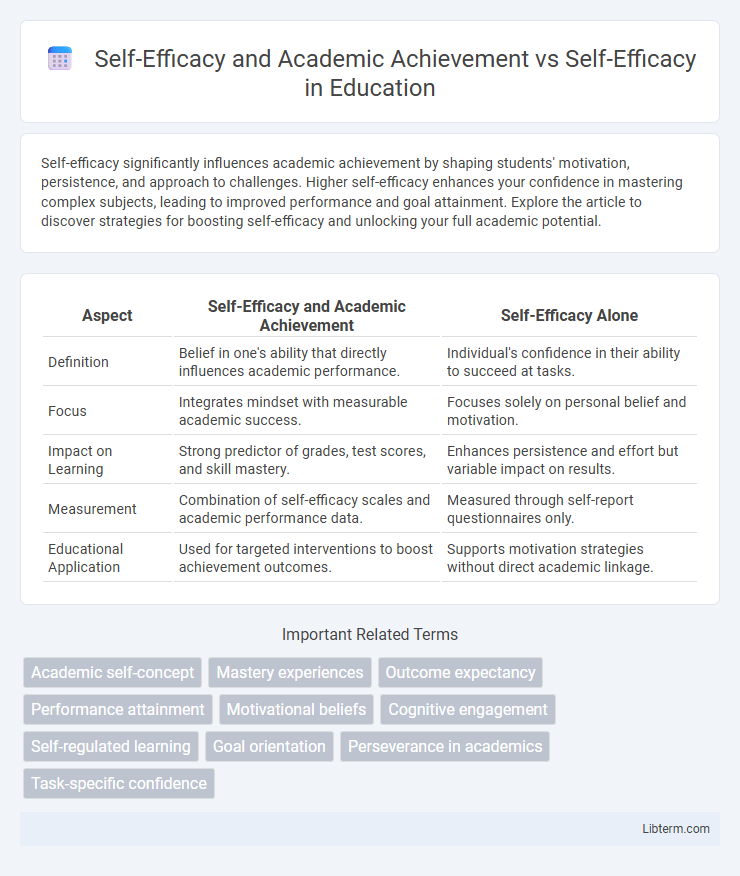Self-efficacy significantly influences academic achievement by shaping students' motivation, persistence, and approach to challenges. Higher self-efficacy enhances your confidence in mastering complex subjects, leading to improved performance and goal attainment. Explore the article to discover strategies for boosting self-efficacy and unlocking your full academic potential.
Table of Comparison
| Aspect | Self-Efficacy and Academic Achievement | Self-Efficacy Alone |
|---|---|---|
| Definition | Belief in one's ability that directly influences academic performance. | Individual's confidence in their ability to succeed at tasks. |
| Focus | Integrates mindset with measurable academic success. | Focuses solely on personal belief and motivation. |
| Impact on Learning | Strong predictor of grades, test scores, and skill mastery. | Enhances persistence and effort but variable impact on results. |
| Measurement | Combination of self-efficacy scales and academic performance data. | Measured through self-report questionnaires only. |
| Educational Application | Used for targeted interventions to boost achievement outcomes. | Supports motivation strategies without direct academic linkage. |
Understanding Self-Efficacy: Definition and Foundations
Self-efficacy refers to an individual's belief in their ability to execute tasks and achieve goals, rooted in Bandura's social cognitive theory, which emphasizes the role of observational learning, social experiences, and reciprocal determinism in shaping self-beliefs. Academic achievement is strongly influenced by self-efficacy, as students with high self-efficacy tend to set challenging goals, exert greater effort, and persist despite difficulties. Understanding the foundational components of self-efficacy, including mastery experiences, vicarious experiences, verbal persuasion, and physiological states, is essential for fostering educational success.
The Role of Self-Efficacy in Academic Achievement
Self-efficacy significantly influences academic achievement by shaping students' motivation, effort, and persistence in learning tasks. High self-efficacy enhances students' confidence in their abilities, leading to better problem-solving skills and higher academic performance in subjects like mathematics and science. Research consistently shows that self-efficacy acts as a critical psychological factor that mediates the relationship between cognitive skills and academic success.
Key Differences: Self-Efficacy vs. Academic Performance
Self-efficacy refers to an individual's belief in their ability to execute tasks successfully, influencing motivation and persistence. Academic achievement denotes measurable performance outcomes, such as grades or test scores, reflecting mastery of educational content. The key difference lies in self-efficacy being a psychological construct shaping effort and resilience, while academic performance represents objective evidence of learning and skill acquisition.
Factors Influencing Students’ Self-Efficacy
Students' self-efficacy is influenced by factors such as mastery experiences, social modeling, social persuasion, and physiological states, which directly impact their academic achievement. Mastery experiences, or successful task completion, enhance confidence, while observing peers succeed through social modeling reinforces belief in one's capabilities. Positive feedback and reduced stress levels further boost self-efficacy, leading to higher motivation and improved academic performance.
Self-Efficacy as a Predictor of Academic Success
Self-efficacy, defined as an individual's belief in their ability to succeed in specific tasks, is a robust predictor of academic achievement. Research consistently shows that higher self-efficacy enhances motivation, persistence, and resilience, directly influencing students' academic performance and success. Educators leverage self-efficacy to design interventions that improve learning outcomes by fostering students' confidence in mastering educational challenges.
Enhancing Self-Efficacy in Educational Environments
Enhancing self-efficacy in educational environments significantly improves students' academic achievement by fostering confidence in their abilities to meet learning challenges. Strategies such as providing constructive feedback, setting achievable goals, and promoting mastery experiences empower learners to develop resilience and motivation. Integrating collaborative learning and real-world problem-solving tasks further reinforces students' belief in their capacity to succeed academically.
Measurement Tools for Assessing Self-Efficacy
Measurement tools for assessing self-efficacy in academic contexts often include the General Self-Efficacy Scale (GSES) and the Academic Self-Efficacy Scale (ASES), both designed to evaluate students' confidence in their abilities to complete academic tasks. These instruments employ Likert-scale items targeting specific domains such as problem-solving, time management, and subject-specific skills, enabling precise correlations between self-efficacy levels and academic achievement. Modern approaches also incorporate computerized adaptive testing and qualitative methods like focus groups to enhance the validity and reliability of self-efficacy assessments.
Self-Efficacy Interventions: Practical Approaches
Self-efficacy interventions significantly enhance academic achievement by empowering students to believe in their abilities through goal-setting, positive feedback, and mastery experiences. Practical approaches include structured skill development, modeling successful behaviors, and creating supportive learning environments that foster resilience and motivation. These targeted strategies improve students' confidence, directly impacting their academic performance and perseverance.
Limitations of Self-Efficacy in Predicting Achievement
Self-efficacy influences academic achievement by shaping students' motivation and persistence, but its predictive power is limited by external factors such as socioeconomic status, teaching quality, and prior knowledge that also impact performance. Variability in self-efficacy measurement methods and contextual differences across subjects reduce the consistency of its correlation with achievement outcomes. Overemphasis on self-efficacy may overlook other critical determinants like cognitive abilities and emotional regulation necessary for academic success.
Future Directions: Bridging Self-Efficacy and Academic Outcomes
Future research should emphasize developing intervention programs that enhance self-efficacy to directly improve academic achievement, utilizing personalized feedback and goal-setting strategies. Exploring neurocognitive mechanisms underlying self-efficacy can provide insights into its impact on learning processes and academic performance. Longitudinal studies integrating diverse populations will strengthen the understanding of how self-efficacy mediates academic outcomes across different educational contexts.
Self-Efficacy and Academic Achievement Infographic

 libterm.com
libterm.com